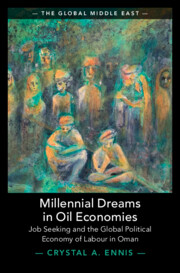Book contents
- Millennial Dreams in Oil Economies
- The Global Middle East
- Millennial Dreams in Oil Economies
- Copyright page
- Contents
- Figures
- Maps
- Tables
- Preface
- Acknowledgements
- A Note on Transliteration
- Abbreviations
- Maps
- 1 Bringing Citizen Labour into IPE Scholarship on the Gulf
- 2 Making Global Labour Markets and National Dreams
- 3 Rereading Omani Work History and Labour Market Governance
- 4 Promising Dubai in Sohar
- 5 Constructing Belonging and Contesting Economic Space
- 6 Pursuing Entrepreneurship for Employment
- Conclusion
- Bibliography
- Index
2 - Making Global Labour Markets and National Dreams
Published online by Cambridge University Press: 02 January 2025
- Millennial Dreams in Oil Economies
- The Global Middle East
- Millennial Dreams in Oil Economies
- Copyright page
- Contents
- Figures
- Maps
- Tables
- Preface
- Acknowledgements
- A Note on Transliteration
- Abbreviations
- Maps
- 1 Bringing Citizen Labour into IPE Scholarship on the Gulf
- 2 Making Global Labour Markets and National Dreams
- 3 Rereading Omani Work History and Labour Market Governance
- 4 Promising Dubai in Sohar
- 5 Constructing Belonging and Contesting Economic Space
- 6 Pursuing Entrepreneurship for Employment
- Conclusion
- Bibliography
- Index
Summary
This chapter is concerned with recentring labour in regional development accounts and framing the claim of the book that the labour markets of Oman and the region are global. Most development accounts articulate Oman’s labour market as an object of development, a self-contained unit to be regulated and deregulated toward developmental ends. Development policy and academic discourse, in short, treat the labour market as a bounded, local space with enclosed, segmented social relations. In contrast to this development planning imaginary, this chapter argues that the labour market needs to be interpreted in global context and with a view of how regulation and relations transpire within, between, and across segmentations. The labour market is a place in which you can clearly see the outcomes of global market pressures and the competing poles for labour’s management and (de)regulation. These come from within but also outside national and regional boundaries. In combination, by looking from the bottom up, the labour market offers a space where we encounter humans in the economy and can more clearly visualise the human impact of economic transformations and choices.
- Type
- Chapter
- Information
- Millennial Dreams in Oil EconomiesJob Seeking and the Global Political Economy of Labour in Oman, pp. 34 - 86Publisher: Cambridge University PressPrint publication year: 2025

